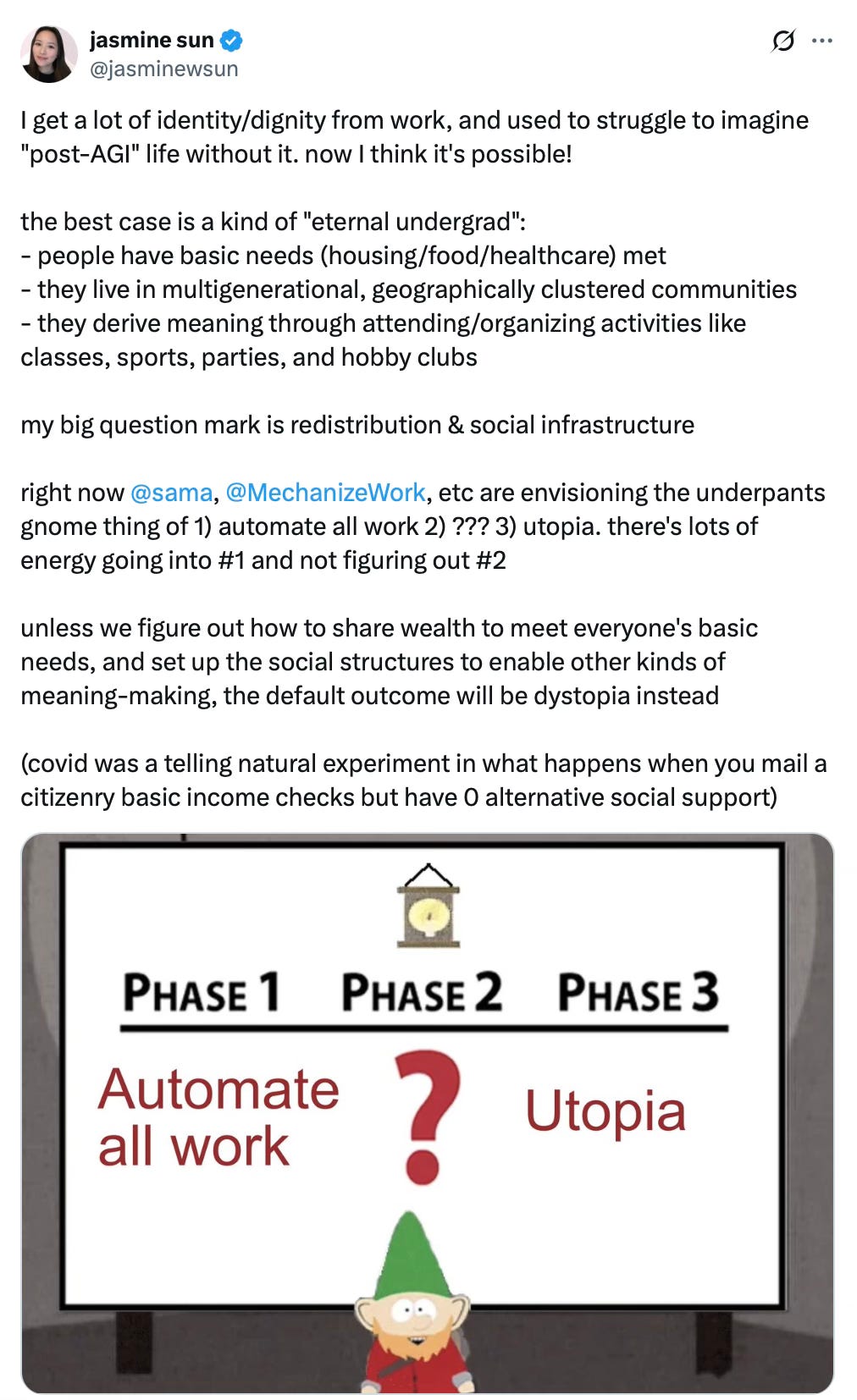Aching muscles, aching minds
A defense of meaningful work in a world that dreams of automating it away
“The last clear definite function of man—muscles aching to work, minds aching to create beyond the single need—this is man. To build a wall, to build a house, a dam, and in the wall and house and dam to put something of Manself, and to Manself take back something of the wall, the house the dam; to take hard muscles from the lifting, to take the clear lines and form from conceiving. For man, unlike any other thing organic or inorganic in the universe, grows beyond his work, walks up the stairs of his concepts, emerges ahead of his accomplishments.”
John Steinbeck, The Grapes of Wrath
A good future, as told to us by leaders of many AI companies, goes something like this: we build artificial general intelligence (AGI), or “autonomous systems that outperform humans at most economically valuable work”1; AGI takes over all knowledge work, leaving humans to do mostly physical labor until robots become sufficiently advanced to take over; AGI generates enormous material abundance; the wealth is distributed through some form of universal basic income, so we can all live in a post-work, post-scarcity society where we are free to lie in the lap of AI-generated luxury.
This is the future we are told we are headed toward (granted, if all goes right); this is the future we are told to desire. And many technologists are fervently building toward it. The New York Times recently profiled an AI company, Mechanize, which is developing virtual work environments to enable a “fully automated economy” that they claim would lead to a world of “radical abundance.” What they envision humans do in this future without work, or how they propose we even make a humane transition to it, they do not make clear; nor do they seem to be particularly concerned about.
Others have proposed ideas for what this post-labor world could look like. Writer Jasmine Sun recently outlined a vision of “eternal undergrad,” in which people’s basic needs are met and they derive meaning through living in community and participating in leisurely activities.
It’s a comforting vision, sure, but a hollow one. Even with communities and hobbies, most of us want our lives to amount to something more. Those who have already achieved a post-work, post-scarcity life today have found that material abundance and endless free time do not make for a meaningful life on their own. The founder of Loom, having sold his company and found himself in the position of never having to work again, wrote: “Everything feels like a side quest, but not in an inspiring way… I have infinite freedom, yet I don’t know what to do with it, and, honestly, I’m not the most optimistic about life.”
But more dangerous than a lack of purpose is the erosion of human agency that comes from outsourcing work — and with it, real responsibility — to machines. When we relinquish the effort of meaningful work, we also limit our capacity to grow and restrict the freedom to shape our own lives and contribute to the world on our own terms.
Work, at its best, plays many roles in our lives: beyond fulfilling material needs, it can provide structure, community, and resources to help us grow. It gives us a foothold in society, a sense of moral responsibility and participation that passive consumption or leisure alone cannot provide.
Admittedly, most jobs today fall short of this ideal. But rather than scrap work altogether, we should ask what meaningful work entails, and consider how we can enable more people to pursue it. This begins with reimagining work not merely as a means of making a living, but as a vocation: a personal calling that aligns our gifts and interests with the world’s needs, that helps us unfold into ourselves while serving something greater.2
It’s easy to see the appeal of a post-work society. For many today, work is dull, draining, and sometimes dehumanizing. We often view it as an unfortunate necessity in a capitalist society, not as a meaningful component of our lives. Why not rid ourselves of it if we have the chance?
But work can (and should) be more than a means of fulfilling our material needs — it can provide the means through which we discover and develop our gifts in service of society. This is an idealistic conception of work, of course, but no less idealistic than the idea of ridding ourselves of work altogether — and ultimately a much more fulfilling one.
As humans, we desire to be useful. Without a sense of real responsibility, we risk falling into a state of existential despair, convinced that our existence bears no significance, that our disappearance would go unnoticed. Beyond a feeling of indispensability, work provides a sort of moral weight; a person without such responsibility, Simone Weil writes, “represents nothing at all in the economic life of his country, and the voting paper which represents his share in its political life doesn’t hold any meaning for him.”
By relinquishing real responsibility in the world, we risk relegating ourselves to a pet-like status: creatures with little power or obligation to shape the world around us. This might seem like liberation — to be freed of commitments and burdens, so we can pursue endless frivolities — but it is a hollow form of freedom. Even the most beloved pets are entirely at the mercy of their owners when their food, shelter, and comfort can be given or withdrawn at will.
True freedom lies not in the absence of responsibility, but in the cultivation of self-sufficiency — having confidence in our ability to survive and thrive, no matter the circumstances. Work is one of the primary means by which we build this capacity. It teaches us to adapt to changing conditions, shoulder responsibility, and develop the self-trust that enables us to tackle even greater challenges. It gives us strength and security in our place in the world — knowing that we have earned what is ours, and that even if it is unjustly taken from us, we can begin again.
To live as a dependent, no matter how comfortably, is to live without agency. If our housing, food, education, and other necessities were managed by a centralized authority that could rescind them at any time — based on behavior, compliance, or opaque criteria — we would not be free. To rely on such a system, whether governmental or technological, for the most basic conditions of life is to tether ourselves to apparatuses we neither control nor fully comprehend. We may feel cared for, but we would be denied the dignity of self-determination.
To exercise our self-determination, we must consider our life to be an ongoing project — something to shape and unfold, not merely endure. This involves learning and improving in ways that matter to us and that serve something beyond ourselves. An “eternal undergrad” society may offer endless education, but it lacks a vital counterpart: meaningful contribution. The aim of higher education is not to prolong adolescence, but to shape us into fuller human beings, capable of participating in the world.
We rejoice when a child takes her first wobbly steps, knowing that in eighteen years she’ll step out of her childhood home, then into jobs, relationships, and responsibilities that continually ask more of her — and help her become more herself in return. Life unfolds in stages, each with its own set of duties and privileges; without this progression, we become feeble and restless.
A more meaningful vision of economic possibility is not to create “radical abundance” by automating away human work, but to create a world in which we can support the kinds of work that may not be financially lucrative, yet are meaningful and essential to the human experience: caring for the young, the sick, and the elderly; tending to the earth; creating music, literature, and art; pursuing scientific inquiries; exploring uncharted territories. A richer society would be one that refuses to offload such responsibilities to machines, and instead devises economic systems that sustain and dignify the kinds of labor that too often go unrecognized or under-supported.
We might begin by reimagining work not simply as labor performed for someone else’s ends, but as a vocation. Our current structures rarely fulfill this ideal by default. The goal should not be to make humans do less, but to enable more people to do the kind of work that is interesting, meaningful, growthful, and deeply satisfying — work that contributes to the world not just economically, but by making it more beautiful, just, and humane.
Let the machines take the dangerous and degrading, the menial and mechanical — but let us not hand over the dignity of meaningful work simply because it demands effort. A truly ambitious vision for technology would not be to replace what humans already do, but to expand what we are capable of doing altogether. There is still so much more to be done, by humans and machines. We might as well roll up our sleeves and get to it.
I wrote this piece on how unfolding is the antidote to the flattening we so often experience from society and technology today:




So neat to see this piece in the world -- I feel you on the meaningful contribution. Right now the world has so many issues still that need solving, and many now are coordination issues (though also a few solo quests too), so I think we have our work cut out for us before we can get to an eternal undergrad. Or maybe that's the pause we need to take before we can get back into the group playground.
A great defense of work. As Freud once said, “Love and work, work and love.”
Work is one of the cornerstones of our civilization. It is as old as human life itself.
At a personal level, work enables expression, purpose, craft, independence, and agency. At a social level, it serves equally important needs: community, shared struggle, camaraderie, and even status signaling. A life without work would feel empty.
I don’t imagine a future in which work disappears. Rather, it will morph into something new. But even if economical work were to fade, people would still benefit from choosing to immerse themselves in deep, difficult, and meaningful work. Anything else will feel ephemeral.